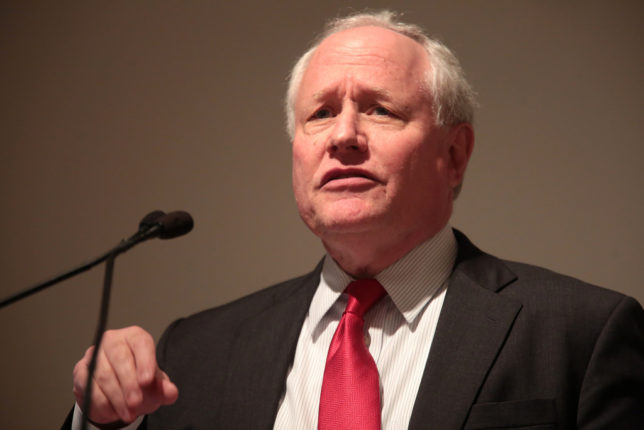Philanthropy
The Decline of a Cheer
And Maybe the Demise of a Beneficial Enterprise...


During the 1970s, Irving Kristol—known as the “godfather of neoconservatism”—famously urged “two cheers for capitalism.” The phrase reflected thinking that underlay larger work Kristol led on establishing a relationship between capitalists and intellectuals. The challenging project helped underpin creation of an intellectual infrastructure that could—and did—successfully stand against the then-reigning liberal ideology of the “new class” of government technocrats and their academic and other allies that had grown so much, and so powerful, beginning in the ’60s. It yielded great benefits, from the ascendancy of conservatism in general to the rise of Reagan and Reaganism in particular in the late ’70s, ’80s, and beyond.
Late last year, when Philip Anschutz decided to no longer continue investing his money in The Weekly Standard magazine co-founded in 1995 by Kristol’s son William—somewhat of a “godfather of anti-Trump conservatism”—many who would fairly be considered intellectuals criticized Anschutz the billionaire capitalist for this unacceptable offense against intellectualism. Some of the criticisms were tainted by more than a little bit of ungraciousness, as helpfully and lamentingly noted by William E. Simon Jr. and James Piereson. In a few of them, a skeptic might perhaps pick up a sense of entitlement.
The New Yorker’s Benjamin Wallace-Wells reported earlier this year that, during an “Irish-wake” gathering of Weekly Standard staffers after the closure, William Kristol joked that maybe Irving Kristol’s “two cheers” should now be edited down to one. Actually, the harsher criticisms constituted one Bronx cheer for capitalism.
Unfortunately, the arguably “class-defensive,” resentful reaction of this cheer may signify the contemporary demise of Irving Kristol’s carefully constructed alliance, with conservative intellectuals now increasingly vying with liberal and progressive ones to express contempt for capitalists. If so, there definitely will be drawbacks.
Added Value
Fostering a connection between businessmen and “thought leaders” was never going to be easy in the first place, and it wasn’t when tried by neoconservatives. The central notion fueling the burgeoning coalition was that left to their own devices, capitalists were losing the culture war to the Left because they had no idea how to really fight it. Funded by wealth generated through capitalism, there had been clumsy attempts by businesses to put a cool and exciting pop-culture gloss on moneymaking, with some Junior Achievement-type “how-to” instruction thrown in.
Irving Kristol argued to those holding or controlling wealth, however, that bad culture needed to be fought with good culture. This often required a measure of patience on the part of those corporate leaders and entrepreneurs hearing the argument at a snooty think tank or reading it in an impenetrable journal. He got them, or at least enough of them, to hear it out.
In large part, at the behest of Kristol and the various activities in which he engaged at the American Enterprise Institute (AEI) and the magazines he edited, some top businessmen and women were willing to bear with thinkers and influencers who were not innately market enthusiasts, but who would reliably demolish utopian plans for replacing capitalism with a command economy that perfectly met everyone’s needs.
One of my old bosses at the Bradley Foundation, William A. Schambra, recalls attending “CEO Seminars” in the ’70s and ’80s at AEI, where he had previously worked. Irving Kristol, Robert Goldwin, Michael Novak, Robert Bork, and others would present this position, throw in their own historically and experientially informed “how-to’s”—and basically offer their two cheers. There may have been some patience required of these non-business presenters, too, as they gave their advice about how to better engage the culture with a reasonable portrayal of the benefits of democratic capitalism.
There was value added by the entire enterprise.
For those capitalists seriously entertaining the arguments and maybe willing to consider doing something about it, to be sure, there were almost always de facto rebuttals forthcoming: younger guilt-ridden family members, fellow Manhattan cocktail-party invitees, or corporate-headquarters public-relations professionals, can always be relied upon to give pointed warnings about the pitfalls of aligning in any way with the right-of-center AEI.
Luckily, at the time, there were major philanthropies like the Olin Foundation led by William E. Simon Sr. and Piereson and later Bradley, along with others, who were able to fund Irving Kristol’s budding neoconservative endeavor to effect meaningful, beneficial connections between business and an intellectual elite willing to defend it, however qualifiedly. Olin and Bradley were unencumbered by bothersome, skittishness-inducing rebuttals; as grantmaking foundations, they were for the most part liberated from such skittishness, and could similarly liberate others with their strategic giving.
Look for It
The moment may have been uniquely fortuitous, unlikely to ever arise again. Funders who’ve gotten rich now seem to want a full-throttled three cheers for capitalism, or worse, crony capitalism. Potential intellectual allies, feeling jilted or underappreciated or whatever, instead see benefit in derisively giving a mere, singular, Bronx version.
In addition to probably being about the right number, Irving Kristol’s whole two-cheers ethos served as a helpful bridge between two groups and positions on which a successful movement was bolstered, if not built. At the current crossroads for conservatism, someone should maybe urge, and fund, the missing middle cheer.



